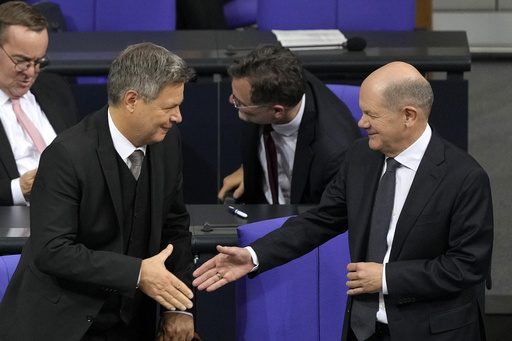
BERLIN — On Tuesday, the principal candidates in Germany’s forthcoming election showcased their agendas, revealing distinct visions for rejuvenating Europe’s largest economy and addressing pressing issues such as migration. Chancellor Olaf Scholz from the center-left Social Democratic Party is aiming for a second term in the parliamentary election scheduled for February 23, following the dissolution of his coalition in a dispute over economic revival strategies. He is hoping to outperform center-right opponent Friedrich Merz, leader of the Union bloc, which currently leads in the polls.
Vice Chancellor Robert Habeck from the environmentalist Greens, Scholz’s remaining coalition ally, as well as Alice Weidel of the far-right Alternative for Germany party, which is performing well in surveys but lacks governmental prospects due to other parties’ refusal to collaborate with it, are also vying for the top position. The Social Democrats, the Union, and the Greens are all eager to advance as much of their respective platforms as possible, though the new government will likely require coalition negotiations and compromises.
Regarding the economy, the Union party is advocating for tax cuts aimed at individuals and businesses and plans to raise the income threshold at which the top tax rate of 42% is applied. Their agenda includes incentives for overtime work, the elimination of a tax formerly levied on all citizens to fund the integration of former East Germany, and efforts to reform the long-term unemployment benefit system to encourage job placements. Additionally, they propose reducing the value-added tax on dining out.
Conversely, Scholz’s Social Democrats promise a reduced tax burden for 95% of earners and aim to decrease the value-added tax on food items. They, along with the Greens, are focused on increasing the national minimum wage, which stands at 12.82 euros ($13.47) on the election day to 15 euros, revisiting a topic both parties campaigned on in 2021. Furthermore, Scholz’s party proposes a “made in Germany bonus” to stimulate investment in new infrastructure and a “Germany fund” designed to attract public and private funding in energy networks, innovative companies, and new housing projects. The Greens suggest a similar infrastructure investment program and advocate for increased contributions from the wealthiest individuals to support education and other initiatives. All candidates propose ways to minimize electricity costs.
The issue of borrowing is also pivotal, with the Social Democrats and Greens advocating for reforms to Germany’s self-imposed borrowing limits known as the “debt brake,” which allows new borrowing up to only 0.35% of the annual GDP and can only be lifted in uncontrollable emergency situations. They assert that the current constraints hamper necessary investment. The debt brake was a significant factor in the downfall of Scholz’s government in November, as his former coalition partners, the pro-business Free Democrats, insisted on maintaining strict adherence to it. The Union party wishes to uphold the rule, citing its prior adaptability during crises and promoting fiscal responsibility for future generations. However, Merz has hinted at the possibility of supporting reforms in the future.
On the topic of migration, the Union proposes a stricter policy at Germany’s borders, suggesting that migrants entering from other nations in Europe’s free travel circuit seeking asylum should be turned away. They aim to enhance deportations of those not entitled to remain and designate more “safe countries of origin.” They also vow to overturn recent legislation that facilitated the citizenship process and dual citizenship regulations established under Scholz’s leadership. In contrast, the Social Democrats maintain that existing measures, including border management, have already resulted in a significant decrease in irregular migration. The Greens advocate for a fair and binding distribution of asylum seekers across Europe.
When addressing the Ukraine conflict, Germany has emerged as Ukraine’s leading military supporter in Europe, second only to the United States. All three primary contenders pledge ongoing assistance, though their priorities differ. Scholz emphasizes maintaining Germany’s status as Europe’s foremost supplier while showcasing his caution in preventing conflict escalation between Russia and NATO, clearly stating that he will not supply long-range Taurus cruise missiles to Ukraine. The Union party and the Greens are more receptive to sending such missiles, with the Union proposing a “contact group” with France, Poland, and the U.K. to coordinate efforts alongside the U.S. for Ukraine’s support and security guarantees.
Current polling indicates that at least two parties among the Union, Social Democrats, and Greens are likely to form a government together. Merz expressed his ambition for the Union party to be strong enough in this election that others would consider partnering with them, rather than the Union feeling compelled to adapt to other parties’ agendas.
